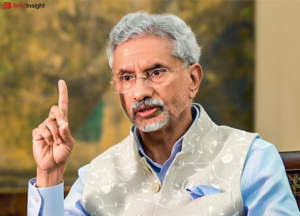With tensions at an all-time high following the Pahalgam terror attack that claimed 26 lives, United Nations Secretary-General Antonio Guterres held back-to-back calls on Tuesday with Indian External Affairs Minister S Jaishankar and Pakistan Prime Minister Shehbaz Sharif.
The conversations come amid Pakistan’s dramatic public claim that it possesses “credible intelligence” of an imminent Indian military strike within the next 24–36 hours, further escalating an already fragile situation.
The UN Chief Jaishankar Shehbaz Pahalgam Attack engagement has drawn attention to growing international unease, with the UN urging both sides to step back from the brink of confrontation and pursue justice lawfully.
Guterres Condemns Pahalgam Attack in Calls to India and Pakistan
In both phone calls, Guterres strongly condemned the April 22 terror attack in Jammu and Kashmir’s Pahalgam, reiterating the UN’s consistent stance against terrorism in all its forms.
“The Secretary-General noted the importance of pursuing justice and accountability for these attacks through lawful means,” said UN spokesperson Stéphane Dujarric at a press briefing.
Guterres expressed deep concern over the rising tensions between India and Pakistan and highlighted the danger of escalation in a region where past confrontations have had global implications.
Pakistan’s Alarming Alert: “India to Strike in 24–36 Hours”
In a surprise announcement on Tuesday evening, Pakistan’s Minister for Information and Broadcasting Attaullah Tarar posted on X (formerly Twitter) that Islamabad had received “credible intelligence” suggesting India would conduct a military strike within 36 hours.
“Pakistan has credible intelligence that India intends to carry out military action against Pakistan in the next 24-36 hours on the pretext of baseless and concocted allegations,” Tarar wrote.
Analysts believe this preemptive statement may be an attempt by Pakistan to internationalize the issue, portraying India as the aggressor and itself as the aggrieved party calling for restraint.
This rhetoric echoes previous playbooks from Islamabad following high-profile terror attacks traced to Pakistan-based outfits, where India has retaliated with surgical or air strikes.
Sharif Demands Neutral Probe, Warns of Full Response
Speaking after his phone call with the UN Secretary-General, Pakistani Prime Minister Shehbaz Sharif issued a statement calling for a “transparent and neutral investigation” into the Pahalgam attack, which he claimed was being used to unfairly target Pakistan.
In a social media post, Sharif stated:
“I reaffirmed Pakistan’s condemnation of terrorism in all its forms, rejected baseless Indian accusations, and called for a neutral investigation into the Pahalgam incident.”
He also used the opportunity to urge the UN to intervene in the Kashmir dispute, referencing past UN Security Council resolutions. Sharif warned that while Pakistan remains committed to peace, “it will defend its sovereignty with full force if challenged.”
This dual messaging—denying involvement yet preparing for retaliation—continues to raise doubts over Pakistan’s true intent, especially as evidence mounts linking Lashkar-e-Taiba proxies to the Pahalgam massacre.
Links Suggested: India-China Trade War: Can India Adopt Trump’s Economic Playbook?
UN Call with S Jaishankar: Accountability Must Prevail
On the Indian side, External Affairs Minister S Jaishankar confirmed his call with Guterres on X, writing:
“Appreciate his unequivocal condemnation of the terrorist attack in Pahalgam. Agreed on the importance of accountability. India is resolved that the perpetrators, planners and backers of this attack are brought to justice.”
India has consistently maintained that the Pahalgam attack was a cross-border terror operation, with intelligence confirming the involvement of Pakistan-based terrorist handlers.
The Indian government has already taken a series of strong actions including:
- Suspension of the Indus Waters Treaty,
- Revocation of all Pakistani visas,
- Downgrading diplomatic missions in both countries.
With domestic anger mounting and national security agencies on high alert, the conversation between Guterres and Jaishankar also signals that India wants justice without further provocation, but will not hesitate to act if necessary.

UN Urges De-escalation, Offers Good Offices
Speaking to the press, Guterres’ spokesperson Dujarric said:
“The Secretary-General expressed his deep concern at the rising tensions between India and Pakistan and underscored the need to avoid a confrontation that could result in tragic consequences.”
In a notable move, Guterres offered his “good offices” to support any de-escalation efforts — a diplomatic term used to suggest UN mediation or facilitation of dialogue if both parties agree.
While India traditionally rejects third-party intervention in bilateral issues with Pakistan, the UN’s expression of concern reflects the gravity of the situation and international pressure to keep tensions in check.
Growing International Concern Over Kashmir Tensions
The developments come just days after:
- The UN Security Council issued a statement condemning the Pahalgam attack.
- Several world leaders, including from France, the US, Israel, and the UK, voiced support for India and condemned terrorism.
- Protests broke out globally over Pakistan’s continued harbouring of terror groups, with public figures like Javed Akhtar and British MPs denouncing Islamabad.
Domestically, the situation remains sensitive, with Indian armed forces on high alert, surveillance intensified along the LoC, and PM Modi chairing multiple emergency meetings including the Cabinet Committee on Security (CCS) and the Cabinet Committee on Political Affairs (CCPA).
Links Suggested: Digital India and Cyber Security: Balancing Innovation and Protection
Conclusion
As the UN steps in diplomatically and Pakistan raises alarms of a potential Indian strike, the situation between the two nuclear-armed neighbours remains tense and fluid.
The conversations between UN Chief Antonio Guterres, S Jaishankar, and Shehbaz Sharif reflect growing global concern over Kashmir and cross-border terrorism.
While India remains committed to bringing justice for the victims of the Pahalgam attack, the world watches closely — hoping that accountability and de-escalation can coexist, and that peace will prevail over provocation.

